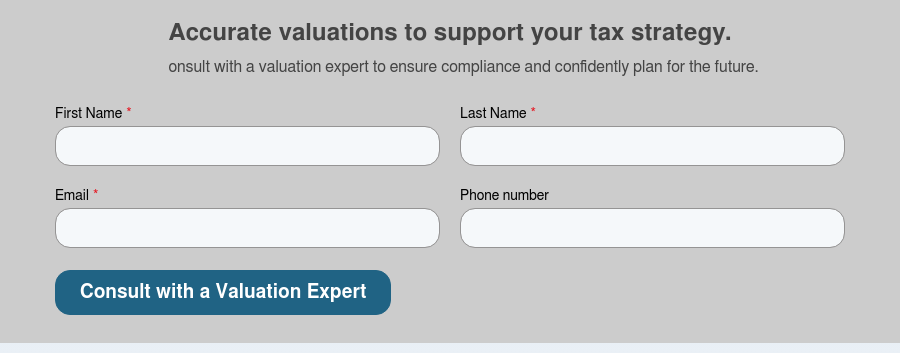Industry Trends
Largest Transactions Closed
- Target
- Buyer
- Value($mm)
Updated: 9/26/2025
When a person transfers assets during their lifetime or after their death, the transfer may be subject to gift or estate tax. In the United States, the Internal Revenue Service (IRS) requires that the fair market value (FMV) of the assets be determined at the time of transfer, and this value is used to calculate the tax liability.
You need an accurate valuation to make sure you don’t overpay and to prove you’ve paid the right amount in the event of a tax dispute. What’s more, valuations are important for determining how to distribute your assets among beneficiaries, especially if the assets are difficult to value – for example, shares or equity in closely held businesses or real estate.
The U.S. tax code is complex, and tax regulations are frequently modified because of changes in the economy, the political climate, and the needs of society. A professional valuation will determine your tax liability by calculating the FMV of your assets, including annuities, promissory notes, and closely held businesses that are operating in nature or holding real estate, personal property, stocks, bonds, and bank accounts. These values in turn provide a foundation for your estate and gift planning.
A gift transfer is the transfer of property, including closely held business interests, promissory notes, and annuities, from one person to another, where the donor does not receive full or FMV in return. Gift transfers are made voluntarily, with no obligation for the recipient to pay the donor for the value of the gift.
In the United States, gift transfers are subject to federal gift tax laws, which are established by Internal Revenue Code (IRC) Section 2512. The federal gift tax applies to gifts made by individuals, and the tax is paid by the donor, not the recipient. The gift tax rules specify the annual exclusion amount by year per recipient, and any gifts in excess of the annual exclusion amount may be subject to gift tax. In 2023, you can donate up to $17,000 each to any number of recipients without those gifts being taxed.
If you wish to transfer equity or shares of a business as a gift, you’ll need to have a business valuation prepared in order to determine the business’s FMV. A clear and objective determination of value is crucial for planning how much of the business to transfer to the next generation and when to do so – whether during your lifetime or after your death. Not only is a valuation important for your goals, but it might even be required by law, depending on the size of the gift, the jurisdiction in which the gift is made, and the tax implications of the transfer.
Gift tax rules and annual exclusion amounts change over time (sometimes annually), and in addition to the federal rules, some states have their own laws – creating a lot of complexity. Consulting with a tax professional who is familiar with both federal and state gift tax laws is essential to navigating this complicated maze of laws and regulations, assessing whether a gift transfer is subject to gift tax, and determining whether a business valuation is required.
An estate tax is a tax on the transfer of property at death. Estate reporting refers to the process of reporting the assets and liabilities of a deceased person’s estate, including closely held business interests, promissory notes, and annuities.
In the United States, IRC Section 2031, which sets forth the rules for determining the taxable value of an estate, requires that the value of all property in your gross estate be determined as of the date of your death. Your taxable estate will be that amount less any deductions for such things as mortgages, debts, and property passed to surviving spouses and qualified charities.
The estate’s executor, or personal representative, is responsible for filing the required tax returns and paying any estate taxes owed. The executor must also provide a complete and accurate inventory of all the estate’s assets and liabilities to the government and other interested parties. The FMV of your property must be reported to appropriate government agencies and other parties via Form 706 if the value of your gross estate (with adjustments for taxable gifts and gift tax exemptions) exceeds the filing threshold for the year of death ($12,929,000 in 2023) – another sound reason to obtain a valuation.
A business valuation is an important tool for estate administration, as it is used to determine the FMV of the property for estate reporting purposes. The FMV is used in calculating the total value of the estate, which in turn informs the distribution of assets to beneficiaries. As noted above, the rules may change over time, so it is important to consult with a tax professional who is familiar with federal estate tax laws to determine whether a business valuation is required for a specific estate.
In the United States, taxpayers can deduct charitable contributions from their taxable income. The general rules for charitable contributions are set forth in IRC Section 170 and require tax filers to include an appraisal summary for any contribution (with some exceptions) that exceeds $5,000.
Specifically, the IRC requires donors to obtain a qualified appraisal prepared by a qualified appraiser under generally accepted appraisal standards. The appraisal must be obtained no earlier than 60 days before the donation, and the contributed property must be received no later than the due date of the donor’s tax return.
If you’re considering gifting a business as a charitable donation, a business valuation will clearly be essential, as it will provide the information you need to calculate the amount of the tax deduction you can take.
A professional, written business valuation report provides evidence of the value of the business at the time of the donation, which is important not only for tax purposes but also for ensuring that the transfer of ownership is properly documented. Further, a business valuation helps ensure that the charitable donation follows all applicable tax laws.
As you consider your estate and gift plans for your business and other assets, it is important to consult with a valuation professional who is familiar with the myriad relevant federal and state laws.
Ensure your estate, gift transfers, and charitable contributions comply fully with IRS regulations. Our professional valuation team specializes in providing accurate, defensible valuations to reduce audit risks and protect your family’s wealth.
Your benefits include:
Fill out the form below to connect with our valuation experts.

Rolf Witt
Rolf Witt specializes in business valuations for estate planning, ESOPs, corporate transactions, and financial reporting. With over five years of experience, he brings deep expertise in valuing privately held businesses across a range of industries and asset classes.
Valuation
Orlando Office
407-621-2140 (direct)
rpearl@pcecompanies.com
Connect
407-621-2140 (direct)
407-621-2199 (fax)
